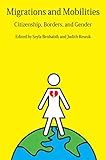Migrations and mobilities citizenship, borders, and gender edited by Seyla Benhabib and Judith Resnik
Tipo de material: Libro
impreso(a)
Idioma: Inglés Detalles de publicación: New York New York University Press c2009Descripción: viii, 505 páginas mapas, retratos 23 centímetrosISBN:
Libro
impreso(a)
Idioma: Inglés Detalles de publicación: New York New York University Press c2009Descripción: viii, 505 páginas mapas, retratos 23 centímetrosISBN: - 0814776000
- 9780814776001
- 305.3 M5
Incluye bibliografía e índice: páginas 491-505
Introduction: Citizenship and Migration Theory Engendered.. I. Situated Histories of Citizenship And Gender.. 1. Citizenship and Gender in the Ancient World: The Experience of Athens and Rome.. 2. The Stateless as the Citizen's Other: A View from the United States.. II. Global Markets, Women's Work.. 3. Citizenship, Noncitizenship, and the Transnationalization of Domestic Work.. 4. A Bio-Cartography: Maids, Neoslavery, and NGOs.. III. Citizenship of the Family, Citizenship in the Family: Women, Children, and the Nation-State.. 5. The mere fortuity of birth ?: Children, Mothers, Borders, and the Meaning of Citizenship.. 6. Transnational Mothering, National Immigration Policy, and European Law: The Experience of the Netherlands.. IV: Engendered Citizenship in Practice.. 7. Global Feminism, Citizenship, and the State: Negotiating Women's Rights in the Middle East and North Africa.. 8. Particularized Citizenship: Encultured Women and the Public Sphere.. 9. Multiculturalism, Gender, and Rights.. V. Reconfiguring the Nation-State: Women's Citizenship in the Transnational Context.. 10. Globalizing Fragmentation: New Pressures on Women Caught in the Immigration-Citizenship Law Dichotomy.. 11. Status Quo or Sixth Ground?: Adjudicating Gender Asylum Claims.. 12. Intercultural Political Identity: Are We There Yet?.. 13. Mobility, Migrants, and Solidarity: Towards an Emerging European Citizenship Regime.. 14. Citizenships, Federalisms, and Gender.. About the Contributors.. Index
In an increasingly globalized world, the movement of peoples across national borders is posing unprecedented challenges, for the people involved as well as for the places to which they travel and their countries of origin. Citizenship is now a topic in focus around the world but much of that discussion takes place without sufficient attention to the women, men, and children, in and out of families, whose statuses and treatments depend upon how countries view their arrival. As essays in this volume detail, both the practices and theories of citizenship need to be reappraised in light of the array of persons and of twentieth-century commitments to their dignity and equality. Migrations and Mobilities uniquely situates gender in the context of ongoing, urgent conversations about globalization, citizenship, and the meaning of borders. Following an introductory essay by editors Seyla Benhabib and Judith Resnik that addresses the parameters and implications of gendered migration, the interdisciplinary contributors consider a wide range of issues, from workers' rights to children's rights, from theories of the nation-state and federalism to obligations under transnational human rights conventions. Together, the essays in this path-breaking collection force us to consider the pivotal role that gender should play in reconceiving the nature of citizenship in the contemporary, transnational world. Inglés


